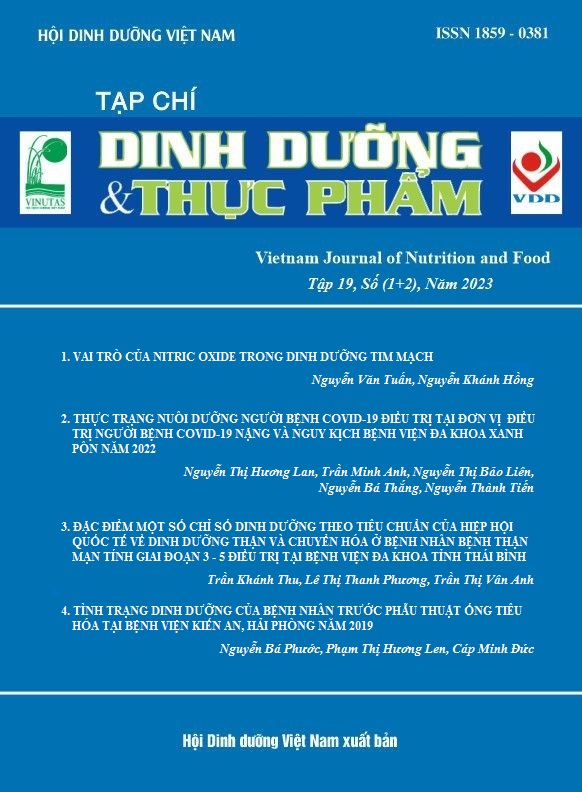ROLE OF NO IN CARDIOLOGICAL NUTRITION
Main Article Content
Abstract
Nitric Oxide (NO) which is produced in vascular endothelial cells, acts as an endocrine mediator, and has protective effects on the cardiovascular system through local vasodilation, angiogenesis, and growth inhibition smooth muscle and endothelial cell proliferation.
NO deficiency causes vascular endothelial dysfunction, compromised NO-mediated vasodilation, increased activation and adhesion of platelets and leukocytes; as well as the activation of cytokines that increase vascular permeability to oxidized lipoproteins and inflammatory mediators. OxLDLs impair the balance between constitutive eNOS and inflammatory factor iNOS in endothelial cells (ECs). Consequences lead to inhibition of protective mechanisms, such as eNOS function and self-protection, ultimately leading to endothelial cell apoptosis and subsequent endothelial dysfunction. The end result is that damage to the smooth muscle structure of the arterial wall, cell proliferation and the formation of atherosclerotic plaque.
Folic acid supplementation has antioxidant effects, increases endogenous NO synthesis through metabolism with BH4, so it has a protective effect on the arterial endothelium. Clinical trials have demonstrated that folic acid supplementation slightly lowers blood pressure, prevents stroke, and reduces cardiovascular events.
Keywords
Nitric Oxide (NO, acid folic, vascular endothelial function, cardiovascular disease
Article Details
References
2. Marc P. McRae. High-dose folic acid supplementation effects on endothelial function and blood pressure in hypertensive patients: a meta-analysis of randomized controlled clinical trials. J Chiropr Med. 2009;8(1):15–24.
3. Zhang Y, Janssens SP, Wingler K, Schmidt HH, Moens AL. Modulating endothelial nitric oxide synthase: a new cardiovascular therapeutic strategy. Am J Physiol Heart Circ Physiol. 2011;301(3):H634-646.
4. Verhaar MC, Stroes E and Rabelink TJ. Folates and Cardiovascular Disease. Arteriosclerosis, Thrombosis, and Vascular Biology. 2002;22:6–13
5. Tran N, Garcia T, Aniqa M, Ali S, Ally A, Nauli SM. Endothelial Nitric Oxide Synthase (eNOS) and the Cardiovascular System: in Physiology and in Disease States. Am J Biomed Sci Res. 2022;15(2):153-177.
6. Frank W Sellke, Amir Lerman, Jay Widmer Crea and Filippo Crea. Coronary artery endothelial dysfunction: Basic concepts. This topic last updated: Aug 15, 2022. https://www.uptodate.com/contents/coronary-artery-endothelial-dysfunction-basic-concepts.
7. Cyr AR, Huckaby LV, Shiva SS, Zuckerbraun BS. Nitric Oxide and Endothelial Dysfunction. Crit Care Clin. 2020;36(2):307-321.
8. Micaela Gliozzi, Miriam Scicchitano, Francesca Bosco, Vincenzo Musolino, Cristina Carresi, and Vincenzo Mollace. Modulation of Nitric Oxide Synthases by Oxidized LDLs: Role in Vascular Inflammation and Atherosclerosis Development. J Mol Sci. 2019;20(13):3294. doi: 10.3390/ijms20133294.
9. Yuxin Luo, Yanbin Zhu, Wangdui Basang, Xin Wang, and Xu Zhou. Roles of Nitric Oxide in the Regulation of Reproduction: A Review. Front Endocrinol (Lausanne). 2021; 12: 752410.
10. Taylor SY, Dixon HM, Yoganayagam S, Price N, Lang D. Folic acid modulates eNOS activity via effects on posttranslational modifications and protein-protein interactions. Eur J Pharmacol. 2013;714(1-3):193-201.
11. Stroes ES, van Faassen EE, Yo M, Martasek P, Boer P, Govers R, Rabelink TJ. Folic acid reverts dysfunction of endothelial nitric oxide synthase. Circ Res. 2000;86(11):1129-1134.
12. Taira J, Ogi T. Nitric Oxide Modulation by Folic Acid Fortification. Antioxidants (Basel). 2020;9(5):393. doi: 10.3390/antiox9050393.


